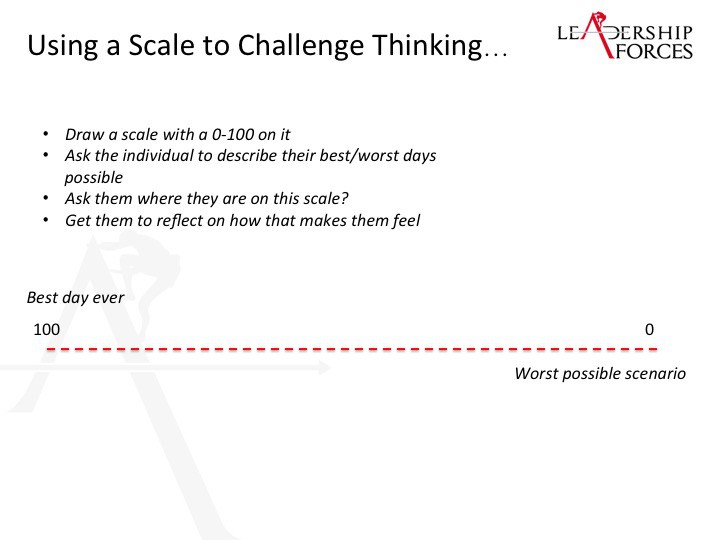There are six common thinking errors that people suffer from. These are examples of negative mental models that people have. I describe them as negative because they usually lead to a behaviour or a feeling that we don’t want. If you can understand them and watch out for the ones that you suffer from, you can amend the ‘thinking error’ and reduce the impact.
The way in which we understand the world is not based on fact, it is based on our perception. Perception is shaped by ‘how you think’ which is informed by our collective experience.
Something happens, you perceive it, it drives an emotion which drives a behaviour.
This is sometimes called the ABC Model. Activating event – Belief System – Emotional Consequence leading to a Behaviour or action.
This is one of the simplest explanations for why people do what they do. The problem comes when a ‘thinking error’ or a ‘negative mental model’ exists because this leads us to behave in a way that we don’t always want to.
There are six common thinking errors. Understanding them is valuable. Firstly, it helps you understand yourself better. It can help you understand why you do some of the things you do and perhaps help you change an aspect of your behaviour that you don’t like. Secondly, once you understand these, you can look out for them in your team or family members exposing the fact that these are ‘thinking errors’ and helping to relieve some of the anxiety that they cause.
Perfectionism
Also known as ‘all or nothing’. Perfectionism leads people to think in absolute terms. Perfectionists will work exceptionally hard on things and usually deliver high quality work but it will often come at a significant cost. These people will ‘over-deliver’ when perhaps ‘good enough’ will do the job. This thinking pattern does lead people to achieve a lot of very successful outcomes so it is constantly reinforced by managers (and parents) who want people to be successful.
As with all of the thinking errors, you can spot them if you listen carefully to the language people use:
- ‘I have to get this perfect’
- ‘I will never get this right’
- ‘I cannot afford to make mistakes’
The way to help people with this is to coach them to understand that not everything they do needs to be perfect. E.g. ‘Your one year old daughter will not be disappointed if not everyone can attend her birthday party.’
Who is the end-user for whatever it is the person is working on? Get them to ask them questions until they are crystal clear on the expectations required. Is this something that can be ‘good enough’ or do you need to ‘deliver to the highest standard possible?’
Labelling
Labelling is a thinking pattern that attaches negative labels to ourselves. In effect, we call ourselves names or put ourselves in a group with negative connotations.
- ‘I am a failure’
- ‘I am not the sort of person that can do this’
- ‘I am so unlucky’
The way to challenge this thinking pattern is to get them to think about what they’ve said and challenge whether it is really true. For instance, just because someone has failed at one thing, that doesn’t mean that they’ve failed at everything. Helping people to understand the perspective of others can be useful. For example, if someone thinks they’re a failure, asking them ‘if their children see them as a failure’ might be helpful.
I should, I must, I can’t…
This is similar to perfectionism. It’s where we set unrealistically high standards for ourselves. Typically when someone is trying to change a behaviour, they bite off far more than they can chew. They set the bar unrealistically high and when they fail to maintain those standards, they punish or label themselves and give up.
- ‘I should get up at 0600 five times a week and go to the gym’
- ‘I must spend more time with my children’
- ‘I can’t afford to get this wrong’
If someone wants to change a behaviour, it is better to start with small but consistent steps. Going cold turkey or making massive changes requires exceptional amounts of willpower. Willpower, like a muscle, tires. Focus on small changes but consistent changes and work up from there.
Let’s say you want to get up at 0600 and start doing more exercise. Plan tomorrow, this evening. Lay out your kit the evening before. Give yourself time to wake up before you start. If this is a new behaviour, just start with 20mins of light activity. Press-ups, Squats, Sit-ups, Burpees, Lunges can all be done in your own living room. Once you’ve been doing 20mins consistently, start gradually increasing the volume of what you do.
Preferences are healthy.
Magnification
This is where people blow things out of proportion. Often called catastrophisation, minor events become ‘a nightmare’.
- ‘I failed the interview. My career is ruined’
- ‘I am stuck in traffic and will miss that meeting, this is a disaster’
- ‘She broke up with me, my life is over’
The way to approach this thinking error is to challenge whether it is a fact. ‘Is anyone going to die? Did anyone get hurt?’
Then it’s probably not that bad! A healthy dose of perspective can really impact this thinking error.
Using a scale can be helpful. Ask them to think of ‘the worst thing that could possibly happen to anyone?’ I often use the scenario of ‘I am in a cage in the middle-east, I am covered in petrol and an ISIS extremist is lighting matches…’ This would be a 1. On the other end of the scale, ask them to think of the ‘best day ever’. That’s a 100.
Now where do they sit on that scale? We forget that there are some people who still struggle to survive every single day. If you were born in the West, you won the ‘birth lottery’. Never compare yourself to people who you believe have ‘more’ than you. This is the fastest way to misery. Compare yourself to people who have less and you will always feel grateful.

Predicting
This is where people consistently predict negative future outcomes. The future is always bleak.
- ‘I am going to mess this up’
- ‘People are always letting me down’
- ‘I am going to miss this penalty’
This thinking error destroys confidence. It can lead to a self-fulfilling prophecy too. If you’ve ever lifted heavy weights or done any form of strenuous exercise, a large part of the battle is mental. Telling yourself that you can push out that final rep or that you will complete the marathon. The mind will give up much faster than the body. Sometimes it’s helpful to remind ourselves of that.
Challenge this thinking error by getting the individual to think about all the things that are going well. Get them to think about the top 2-3 achievements that they’re most proud of. Ask them why they’re most proud of them. The act of telling the story will put them into a more positive frame of mind.
Discounting
This is when someone minimises the positive factors in favour of the negative aspects.
- ‘He is only saying that I did a good job because he feels sorry for me’
- ‘I was lucky to make that sale’
- ‘I can’t believe I passed, it must have been an easier test than I thought’
The way to challenge this behaviour is to ask the individual whether this is a fact or perception. Helping them to understand the difference will illuminate this thinking error.
Summary
These six thinking errors are very common. They’re created by the stories we tell ourselves about our past. These stories and how we understand them shape the way in which we view the world.
Understanding which ones we suffer from can be extremely helpful in controlling anxiety and stress. Meditation can be very helpful in this context because it helps us generate presence and awareness of what is going on inside our heads.
I think that the most valuable element of understanding these thinking errors is that you’re better armed to support other people. These are tools that are applicable in the workplace and in the home. Hopefully you can use them to provide some support and a bit of relief from the anxiety that we all suffer from, from time to time.
If you’ve enjoyed this article or found it useful – share it with someone who you think might benefit from it. Thank you!
Article by channel:
Everything you need to know about Digital Transformation
The best articles, news and events direct to your inbox
Read more articles tagged: Featured, Leadership







